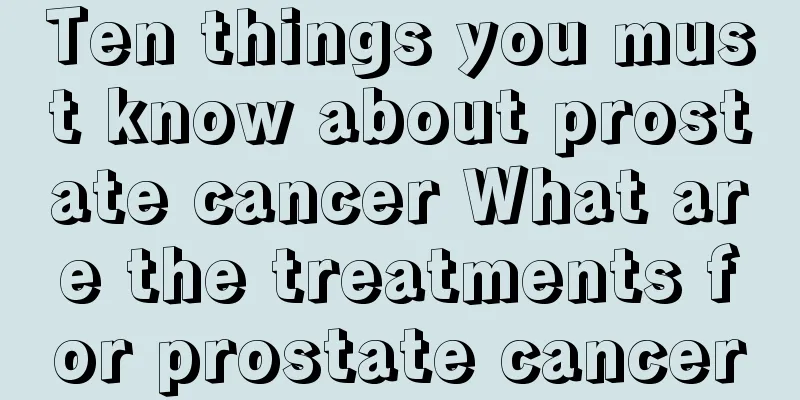Ten things you must know about prostate cancer What are the treatments for prostate cancer

|
Prostate cancer is a very embarrassing thing for men, so men must always check whether there are any abnormalities in their bodies. If they find any, they should go to the hospital for diagnosis immediately. Pay attention to what little knowledge patients with prostate cancer should know. 1. Listen to your wife’s advice Due to the busy daily work of modern people, they usually have little time to see a doctor. Many people often go to the hospital for treatment only when they are half dead. It was only at the insistence of his wife that Diblas went to the hospital for a physical examination and found that he had prostate cancer. But cancer does not appear in our bodies overnight, which is why we should have physical examinations and tests every year starting at the age of 50. We must detect the disease in time before symptoms appear, because the earlier the disease is discovered, the earlier it can be treated. According to experts, the earlier cancer is discovered, the higher the probability of cure. Therefore, we must insist on physical examinations. 2. Prostate cancer is more common than you think Prostate cancer is the most common non-skin cancer in the U.S., with about one in six men diagnosed with the disease in their lifetime, according to the Prostate Cancer Foundation in Santa Monica, Calif. About 65% of diagnosed prostate cancer patients are over the age of 65, because the older a man gets, the more likely he is to get the disease. This year, only one in 10,000 men under the age of 40 will be diagnosed with prostate cancer, compared with one in 38 men between the ages of 40 and 59 and one in 14 men between the ages of 60 and 69. 3. Genetic and ethnic factors affect the probability of developing prostate cancer Genetics and ethnicity can predetermine your chances of developing prostate cancer. Doctors recommend that you start getting checkups at age 40 if your father or brother has had prostate cancer or if you are African American. African American men are 60 percent more likely to develop prostate cancer than Caucasian men, and they are twice as likely to die from the disease, according to the Prostate Cancer Foundation. 4. Lifestyle and eating habits also affect the probability of prostate cancer Studies have found that sedentary lifestyles and high-fat diets can both cause prostate cancer. "If you look at Eastern cultures, they have a very low rate of prostate cancer," said Dr. Brian Moran, a radiation oncologist at the Chicago Prostate Cancer Center in Westmont, Illinois, U.S. "When you look at Western cultures, you find that our second generation has almost the same rate of disease as we do. We think it's the high fat in the diet." 5. Understanding the symptoms of prostate cancer is crucial According to the Prostate Cancer Foundation, most men do not experience any symptoms in the early stages of prostate cancer, and if the disease is caught early, it is more likely to be cured. Here are some symptoms of prostate cancer: frequent bowel movements, especially at night; difficult bowel movements, painful urination; burning sensations; difficulty with erections; painful ejaculation; blood in the urine or semen; and frequent pain or stiffness in the lower back, buttocks, and thighs. These symptoms don't necessarily mean you have cancer; they could be symptoms of other conditions, which is why a thorough checkup is so important. 6. Not all prostate cancers require treatment Even if you are diagnosed with prostate cancer, chemotherapy or surgery is not recommended right away. Depending on the patient's age, quality of life, and other medical conditions, doctors sometimes recommend that patients not receive treatment right away or wait for a while. For example, if an elderly man with prostate cancer is considered low risk and has heart disease or other life-threatening conditions, it may be best not to take any treatment. "When most men find out they have prostate cancer, their first reaction is 'get treated,'" said Dr. Eric Klein, a urologist at the Cleveland Clinic. "There is strong evidence that we overreact to some malignancies that rarely spread, and we don't need to treat them at all at this point unless they spread rapidly. The biggest difficulty at this stage is still trying to analyze whether we need to treat." 7. Don’t Make an Immediate Decision If the bad news comes true, don't panic at this time. There are so many ways to treat prostate cancer today, so continue to work hard and make sure you find the right doctor to help you make the right decision. "Too often we see doctors making decisions for their patients," said Dr. Richard Stock, a radiation oncologist at Mount Sinai Medical Center in New York City. "If you let your doctor make decisions about your health, then you are depriving yourself of the opportunity to make good choices and learn about new treatments." 8. Doctor experience is crucial Experts, including Cleveland Clinic urologist Dr. Eric Klein, say doctors should be experienced in assessing a patient's individual condition and lifestyle to help determine a course of treatment. Dr. Klein says a large body of research supports this concept, especially when surgery is used. "If you compare a doctor who has done more than 1,000 surgeries to a doctor who has done 250 or fewer surgeries, there's about a 30 percent difference in the success rate of the procedure," he says. 9. Patients can still have a normal sex life All prostate cancer treatments can cause erectile dysfunction (ED), but this problem is usually temporary and depends on the individual's condition and the treatment. Some experts say that erectile dysfunction is often worse after surgery but that it gets better over time and is not likely to go away. However, if radiation therapy and short-term treatment are used, erectile dysfunction will gradually worsen over time. Other experts believe that it all depends on a person's lifestyle. Once the prostate is removed, even if you can still have orgasms as before, there will be no ejaculation because there is no semen. 10. Prostate cancer may be curable Both surgery and radiation therapy can cure prostate cancer, but doctors warn that while the chances of cure are about the same with each treatment, patients should consider the side effects of all treatments. Because about 90% of prostate cancers are found in the localized stage, the chances of cure are much higher. In fact, nearly 100% of men diagnosed at this stage are cured after five years, compared with only 67% of men diagnosed at this stage in the 1970s. The above ten reactions are all things that need your attention. After patients know this knowledge, it will be very helpful for the treatment of the disease. We must encourage prostate cancer patients more. Only in this way can we let them see hope. We must provide them with the most careful care. |
Recommend
What should I pay attention to if I have lung nodules
The lungs are an important respiratory organ in t...
Is it good to stick ginger on the navel to treat constipation?
Some of you may have heard that applying ginger s...
What to do if black blood blisters grow inside the mouth
In life, the function of the mouth is very powerf...
The early symptoms of bone cancer are briefly introduced below
Many people must have heard of bone cancer. Bone ...
What are the dietary taboos for thyroid cancer
What are the dietary taboos for thyroid cancer? F...
What are the beauty and skin care methods of olive oil
Olive oil contains substances that are extremely ...
Benefits of Astragalus injection into Zusanli
After injection, it can reach the lesion directly...
Note: What diseases are easily confused with nasopharyngeal carcinoma?
In recent years, nasopharyngeal carcinoma has bec...
What to do if the sterling silver earrings turn black
If you find that your sterling silver earrings ha...
What is the reason for nosebleed every few days
Some people never have nosebleeds for a whole yea...
The efficacy and function of wind-chasing oil
Wind-chasing oil is a medicine applied on the out...
Common examination methods for glioma
Glioma is a malignant brain tumor. In recent year...
How to prevent ovarian tumors in daily life
In today's society, women have been liberated...
What are the hazards of hair treatment ointment
Hair can keep our scalp warm and protect it, but ...
Silicone-free shampoo
Silicone oil has a wide range of uses, and the on...









